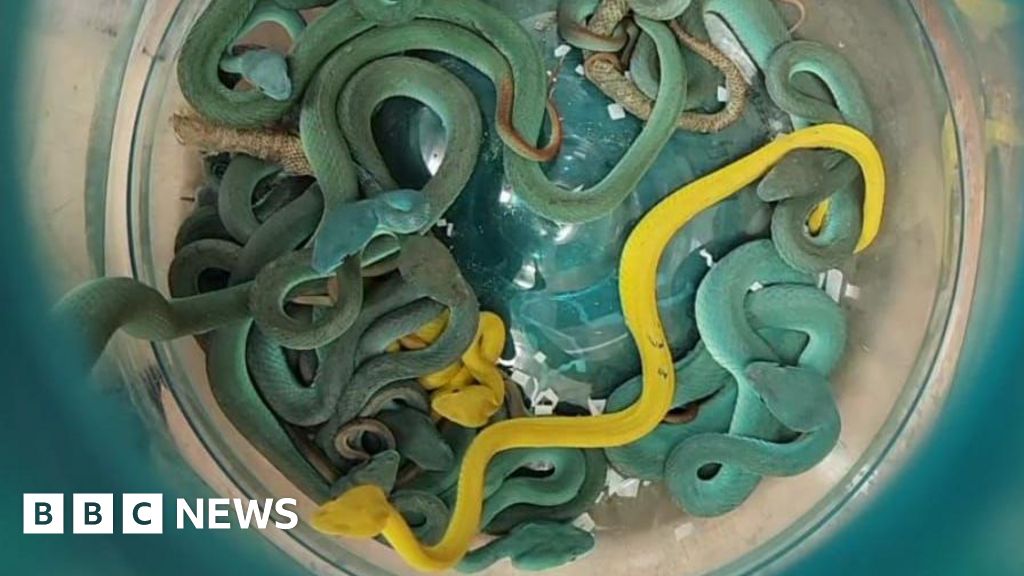- Green
At least 66 children in Gaza have starved to death during Israel’s genocide
时间:2010-12-5 17:23:32 作者:Trends 来源:Earth 查看: 评论:0内容摘要:But the week before her trip, Zoya made a surprise discovery while browsing Yandex.Market, one of several Russian answers to Amazon, where she regularly shops.But the week before her trip, Zoya made a surprise discovery while browsing Yandex.Market, one of several Russian answers to Amazon, where she regularly shops.
"Companies are responsible for how their products are being used. It’s crucial for companies to make sure that they are not causing or contributing to adverse human rights impacts related to their operations. They should seek to prevent or mitigate the adverse human rights effects," Ella Skybenko, a researcher at the London-based Business & Human Rights Resource Centre, told Al Jazeera.Skybenko said that companies should carry out enhanced due diligence and put in place mechanisms to identify suspicious orders from third parties.

“For instance, if the order is unusually large, a producer can start asking questions,” she said. “I know some companies require their customers to testify that their goods would not be shipped to Russia.”Mechanisms for holding companies accountable, however, are limited, apart from The International Criminal Court, and only address the most direct examples of harm, such as where their components are used in weapons used to target civilians.Ukraine’s National Agency on Corruption Prevention (NACP) maintains a database of foreign components reportedly found in Russian and Iranian weapons in Ukraine, listing thousands of items from dozens of countries including the US and many members of the EU.

Among the companies named in the database are household brands including Bosch, Hitachi, Canon and LG.Bosch told Al Jazeera that it “instituted and maintains policies and procedures reasonably designed to meet and achieve regulatory compliance requirements, applicable export control laws and regulations."

"It is our goal to prevent Bosch products from being used in a way that violates sanctions at the end of the direct or indirect supply chain within our sphere of influence,” a spokesperson said.
Other companies named in the database did not reply to Al Jazeera.“Sudan is on the brink of a full-scale public health disaster,” said Eatizaz Yousif, Sudan country director for the International Rescue Committee. “The combination of conflict, displacement, destroyed infrastructure, and lack of clean water is fuelling the resurgence of cholera and other deadly diseases,” she told AFP.
Since August 2024, Sudan has reported more than 65,000 suspected cholera cases and at least 1,700 deaths across 12 of its 18 states. Khartoum alone has seen 7,700 cases and 185 deaths, including more than 1,000 infections in children under five.The spread of disease is expected to worsen with the upcoming rainy season, which is likely to further restrict humanitarian access. Aid groups warn that unless urgent action is taken, the death toll could soar.
According to the United Nations children’s agency UNICEF, more than one million children are at risk in cholera-affected areas of Khartoum.“We are racing against time … to provide basic healthcare, clean water and good nutrition,” said Sheldon Yett, UNICEF’s representative in Sudan. “Each day, more children are exposed to this double threat of cholera and malnutrition.”
- 最近更新
- 2025-07-07 05:55:45‘The shelter was full’: Israelis confront unprecedented missile barrages
- 2025-07-07 05:55:45What is Europe’s stance on the Israel-Iran conflict?
- 2025-07-07 05:55:45Video Duration 28 minutes 05 seconds play-arrow28:05
- 2025-07-07 05:55:45What is Iran’s Fordow nuclear facility that the US has bombed?
- 2025-07-07 05:55:45Lockerbie: Remembering the victims of Flight 103
- 2025-07-07 05:55:45Israel’s war on Iran – decades in the making
- 2025-07-07 05:55:45Preemptive strike? The media and Israel’s attack on Iran
- 2025-07-07 05:55:45Can the Global South stop genocide? Gandikota Nellutla and Ken Roth
- 热门排行
- 2025-07-07 05:55:45Joanna Gaines’s Apple Baked Beans
- 2025-07-07 05:55:45'Shrinking Nemo': Smaller clownfish sound alarm on ocean heat
- 2025-07-07 05:55:45prompting slides to be deployed
- 2025-07-07 05:55:45UK car making plunges to lowest for over 70 years
- 2025-07-07 05:55:45No-Touch Accurate Forehead Digital Thermometer
- 2025-07-07 05:55:45Iran’s dual nationals caught between Israeli bombs and family ties
- 2025-07-07 05:55:45above the nation's capital
- 2025-07-07 05:55:45Video Duration 25 minutes 00 seconds play-arrow25:00
- 友情链接
- Heavy new levies on washing machines, fridges and ovens from Monday could worsen inflation Suicide bombing kills 22 inside Damascus church Iran’s supreme leader faces his defining moment The art of being an unchill host Why Keir Starmer made Nigel Farage Britain’s ‘real opposition’ The rise of Alexandr Wang: Meta’s $14bn bet on 28-year-old Scale AI chief Bond investing group buys as long-term borrowing costs soar to record highs Moral MoneySign up for our newsletter Syrian government blames jihadi group Isis for first major terror attack since fall of Assad regime Oil prices spike, US stocks fall on Israel-Iran crisis ‘Growing number’ of Britons view Israel’s actions in Gaza as genocide: Poll Heavy new levies on washing machines, fridges and ovens from Monday could worsen inflation opinion content. AI is the answer, whatever the question Resilience to Trump tariffs helps push Tampa to top of FT-Nikkei rankings Swamp Notes podcast. Trump considers war in Iran Israel’s Gaza actions may breach EU-Israel human rights agreement: Report Why the serial CEO has fallen out of fashion US billionaire Woody Johnson to buy stake in Crystal Palace Pimco bets on long-term Japanese debt in ‘dislocated’ market Syrian government blames jihadi group Isis for first major terror attack since fall of Assad regime US semiconductor maker Wolfspeed to file for bankruptcy video content. Michael Saylor's $40bn bitcoin bet | FT Film Elon Musk’s X sues New York to block social media hate speech law Photos: Israel and Iran trade strikes for a third day Review. F1 — Brad Pitt’s charisma fuels roaringly good tale of clashing racers and egos Review. The Genius Myth — or why it’s wrong to lionise the likes of Elon Musk Resilience to Trump tariffs helps push Tampa to top of FT-Nikkei rankings Why Israel wants US bunker busters to hit Iran’s Fordow nuclear site The Big Read. What happens to Nato if the US steps back? World’s second-largest asset manager estimates reduction will save investors $3.5mn a year
